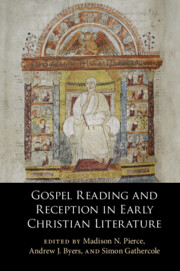31 results
Kendall Walser Cox, Prodigal Christ: A Parabolic Theology (Waco, TX: Baylor University Press, 2022), pp. xiv + 273. $64.99
-
- Journal:
- Scottish Journal of Theology / Volume 77 / Issue 2 / May 2024
- Published online by Cambridge University Press:
- 28 February 2024, pp. 206-208
- Print publication:
- May 2024
-
- Article
- Export citation
Index of Ancient Sources
-
- Book:
- Gospel Reading and Reception in Early Christian Literature
- Published online:
- 27 January 2022
- Print publication:
- 17 February 2022, pp 269-283
-
- Chapter
- Export citation
Introduction
-
-
- Book:
- Gospel Reading and Reception in Early Christian Literature
- Published online:
- 27 January 2022
- Print publication:
- 17 February 2022, pp 1-8
-
- Chapter
- Export citation
Bibliography
-
- Book:
- Gospel Reading and Reception in Early Christian Literature
- Published online:
- 27 January 2022
- Print publication:
- 17 February 2022, pp 244-268
-
- Chapter
- Export citation
Contents
-
- Book:
- Gospel Reading and Reception in Early Christian Literature
- Published online:
- 27 January 2022
- Print publication:
- 17 February 2022, pp vii-viii
-
- Chapter
- Export citation
3 - Gospel Reading and Prosopological Exegesis in Luke-Acts
- from Part I - Reading the Gospel in Israel’s Scriptures
-
-
- Book:
- Gospel Reading and Reception in Early Christian Literature
- Published online:
- 27 January 2022
- Print publication:
- 17 February 2022, pp 48-68
-
- Chapter
- Export citation
Part I - Reading the Gospel in Israel’s Scriptures
-
- Book:
- Gospel Reading and Reception in Early Christian Literature
- Published online:
- 27 January 2022
- Print publication:
- 17 February 2022, pp 9-68
-
- Chapter
- Export citation
Copyright page
-
- Book:
- Gospel Reading and Reception in Early Christian Literature
- Published online:
- 27 January 2022
- Print publication:
- 17 February 2022, pp iv-iv
-
- Chapter
- Export citation
Dedication
-
- Book:
- Gospel Reading and Reception in Early Christian Literature
- Published online:
- 27 January 2022
- Print publication:
- 17 February 2022, pp v-vi
-
- Chapter
- Export citation
Part III - Gospel Reading as Ecclesial Tradition
-
- Book:
- Gospel Reading and Reception in Early Christian Literature
- Published online:
- 27 January 2022
- Print publication:
- 17 February 2022, pp 165-243
-
- Chapter
- Export citation
Part II - Gospel Writers as Gospel Readers
-
- Book:
- Gospel Reading and Reception in Early Christian Literature
- Published online:
- 27 January 2022
- Print publication:
- 17 February 2022, pp 69-164
-
- Chapter
- Export citation
Contributors
-
- Book:
- Gospel Reading and Reception in Early Christian Literature
- Published online:
- 27 January 2022
- Print publication:
- 17 February 2022, pp ix-x
-
- Chapter
- Export citation
Index of Modern Authors
-
- Book:
- Gospel Reading and Reception in Early Christian Literature
- Published online:
- 27 January 2022
- Print publication:
- 17 February 2022, pp 284-287
-
- Chapter
- Export citation
Index of Subjects
-
- Book:
- Gospel Reading and Reception in Early Christian Literature
- Published online:
- 27 January 2022
- Print publication:
- 17 February 2022, pp 288-290
-
- Chapter
- Export citation

Gospel Reading and Reception in Early Christian Literature
-
- Published online:
- 27 January 2022
- Print publication:
- 17 February 2022
4 - Extra-Divine Discourse
-
- Book:
- Divine Discourse in the Epistle to the Hebrews
- Published online:
- 14 August 2020
- Print publication:
- 23 July 2020, pp 135-174
-
- Chapter
- Export citation
Contents
-
- Book:
- Divine Discourse in the Epistle to the Hebrews
- Published online:
- 14 August 2020
- Print publication:
- 23 July 2020, pp ix-x
-
- Chapter
- Export citation
3 - Intra-Divine Discourse (2)
-
- Book:
- Divine Discourse in the Epistle to the Hebrews
- Published online:
- 14 August 2020
- Print publication:
- 23 July 2020, pp 91-134
-
- Chapter
- Export citation
Acknowledgments
-
- Book:
- Divine Discourse in the Epistle to the Hebrews
- Published online:
- 14 August 2020
- Print publication:
- 23 July 2020, pp xi-xii
-
- Chapter
- Export citation
6 - Conclusion
-
- Book:
- Divine Discourse in the Epistle to the Hebrews
- Published online:
- 14 August 2020
- Print publication:
- 23 July 2020, pp 200-211
-
- Chapter
- Export citation



